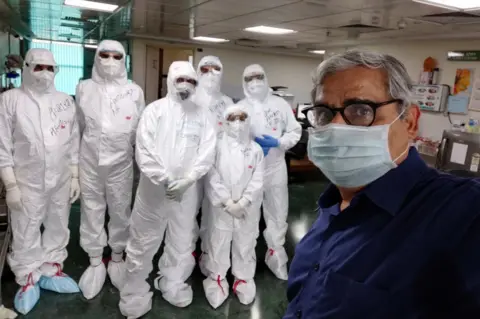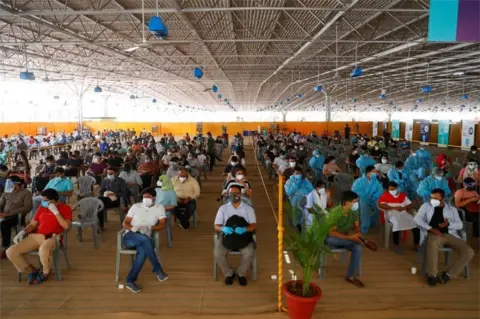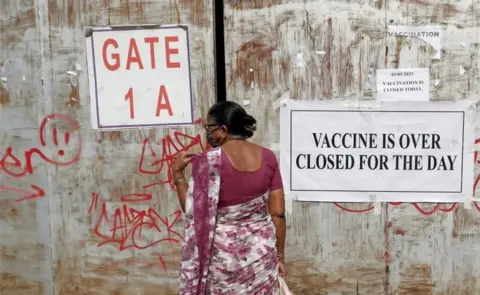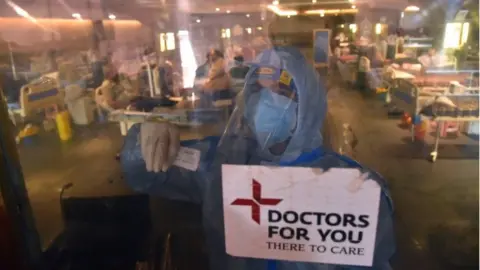India Covid: Do reinfections pose a challenge to vaccines?

 PALLAVA BAGLA
PALLAVA BAGLAThree weeks after he had been fully vaccinated against the coronavirus, a science journalist in Delhi developed high fever, a sore throat and a general feeling of discomfort.
On 22 April, Pallava Bagla tested positive for the coronavirus. Four days later, a chest scan showed his clear lungs turning white, a sign of infection.
As the fever persisted, he was admitted to hospital - eight days after his first symptoms.
At the All India Institute of Medical Sciences, doctors put Mr Bagla, 58, through blood tests and administered steroids. As he had an underlying condition - diabetes - his blood sugar soared. Luckily, his oxygen levels never fell perilously low.
Before he left the hospital after eight days, doctors showed him a scan of the lungs of an unvaccinated, diabetic, male Covid-19 patient of his age, and compared it to his scan.
"The difference was clear. The doctors told me that if I had not taken the vaccine I would have probably landed up on the ventilator in critical care. Timely and full vaccination saved my life," Mr Bagla says.
Although India has fully vaccinated a paltry 3% of its 1.3 billion people, breakthrough cases - people contracting the infections two weeks after being fully vaccinated - appear to be rising.
 Reuters
ReutersHealth workers - doctors, nurses, hospital and clinic workers - have borne the brunt of such infections so far. Mr Bagla appeared to be an exception to the rule, so scientists took swabs from his nose and throat to crack the genetic code of the virus which infected him.
The aim is find answers to a question scientists are grappling with: Are our existing vaccines - two in the case of India - protecting us enough from newer and often more transmissible variants of the coronavirus?
Coronavirus vaccines are indisputably effective. Although they don't prevent infection, they protect most people against severe illness and death by even the most dangerous variants of the virus. But vaccines are not 100% perfect, and they have to work particularly hard during a fast-growing epidemic.
So "vaccine breakthrough infections" are not unexpected.
Of the 95 million people fully vaccinated in the US until 26 April, 9,045 developed breakthrough infections, according to the Centers for Disease Control and Prevention (CDC).
Eight hundred and thirty five (9%) were hospitalised and 132 (1%) died. Nearly a third of the hospitalised patients and 15% of the deaths were reported as "asymptomatic or not related to Covid-19".
Thanks to poor data, the evidence in India is still patchy.
There are reports of a rising number of breakthrough infections with a large number of healthcare workers infected after being fully vaccinated, and even a few deaths. But whether the infection directly caused the deaths is unclear.
 Reuters
ReutersOfficial figures claim two to four persons in every 10,000 vaccinated people in India have had a breakthrough infection. But the data appears to be incomplete: for three months those getting tested weren't asked whether they had been vaccinated.
Evidence from hospitals is mixed.
Dr Vincent Rajkumar, a professor of the Mayo Clinic in the US, says he spoke to two major state-run hospitals in Tamil Nadu in southern India and found that a very "small fraction" of their vaccinated workers had contracted the infection. "The few who had it had quickly recovered," he told me.
On the other hand, 60% of doctors in the intensive care unit in Lok Nayak Jai Prakash Narayan (LNJP) Hospital, Delhi's largest Covid-19 hospital, were infected after being fully vaccinated, but none required hospitalisation, according to Dr Farah Husain, a critical care specialist. "Some of the members of their families got sick and needed hospitalisation," she said.
A study in another Delhi hospital, Fortis C-DOC, found 15 of 113 vaccinated health workers got the infection two weeks after the second dose. Fourteen of the cases were mild, and only one required hospitalisation.
"We are seeing a lot of breakthrough infections among health workers. But most of them are mild. Vaccines are blocking severe infection," says Dr Anoop Misra, a diabetologist and a co-author of the study.
 EPA
EPASwabs taken from six fully vaccinated healthcare workers who suffered from breakthrough infections in the state of Kerala were recently sequenced for a study.
Two of the patients had been infected by variants which had mutations that bypassed the body's immunity, but none of the cases developed severe disease, according to Dr Vinod Scaria, a leading geneticist and one of the study's authors.
Scientists say India needs much more data to check the prevalence of such infections in the general population, and to find out more about how the vaccines are working.
"The question that people are now frequently asking is whether it is true that a large number of people are getting re-infected after their vaccinations," says Dr Shahid Jameel, a virologist.
"Such anecdotal reports cause a lot of anguish in the minds of people who want to get vaccinated."
The bigger worry is that the daily vaccination rates in India are slipping and herd immunity appears to be far away. (Herd immunity happens when a large portion of a community becomes immune to a disease through vaccination or through the mass spread of the disease.) Vaccine reluctance can make matters worse.
Scientists say that India's deadly and uncontrolled second wave will make it easier for the virus to mutate, with the more contagious ones likely to escape the immunity offered by vaccines.
Sequencing to track viral mutations will remain the key to prepare for future waves of infection.
The bottom line, scientists say, is that vaccines - with varying degrees of efficacy - are protecting against severe disease and hospitalisation.
But since the fully vaccinated can still get infected and infect others, safeguards should not be lowered - masking up, avoiding crowded social gatherings and poorly-ventilated, air-conditioned workspaces - for a long time to come.
Double masking, for example, should be made mandatory, as India's Kerala state has done. Public health messaging, which has been largely confusing so far, has to be precise: Can fully vaccinated people, for example, gather freely indoors, at homes and workplaces?
"Vaccines work. But they don't give you the licence to be reckless and let down your guard. You must remain very cautious," Mr Bagla says. He should know.


